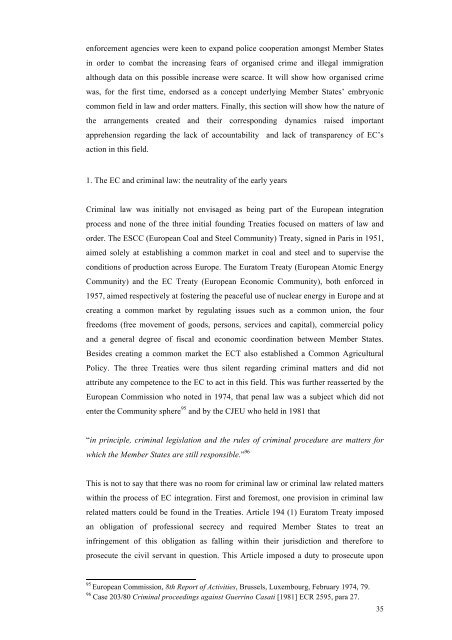The evolution of European Union criminal law (1957-2012)
The evolution of European Union criminal law (1957-2012)
The evolution of European Union criminal law (1957-2012)
Create successful ePaper yourself
Turn your PDF publications into a flip-book with our unique Google optimized e-Paper software.
enforcement agencies were keen to expand police cooperation amongst Member States<br />
in order to combat the increasing fears <strong>of</strong> organised crime and illegal immigration<br />
although data on this possible increase were scarce. It will show how organised crime<br />
was, for the first time, endorsed as a concept underlying Member States’ embryonic<br />
common field in <strong>law</strong> and order matters. Finally, this section will show how the nature <strong>of</strong><br />
the arrangements created and their corresponding dynamics raised important<br />
apprehension regarding the lack <strong>of</strong> accountability and lack <strong>of</strong> transparency <strong>of</strong> EC’s<br />
action in this field.<br />
1. <strong>The</strong> EC and <strong>criminal</strong> <strong>law</strong>: the neutrality <strong>of</strong> the early years<br />
Criminal <strong>law</strong> was initially not envisaged as being part <strong>of</strong> the <strong>European</strong> integration<br />
process and none <strong>of</strong> the three initial founding Treaties focused on matters <strong>of</strong> <strong>law</strong> and<br />
order. <strong>The</strong> ESCC (<strong>European</strong> Coal and Steel Community) Treaty, signed in Paris in 1951,<br />
aimed solely at establishing a common market in coal and steel and to supervise the<br />
conditions <strong>of</strong> production across Europe. <strong>The</strong> Euratom Treaty (<strong>European</strong> Atomic Energy<br />
Community) and the EC Treaty (<strong>European</strong> Economic Community), both enforced in<br />
<strong>1957</strong>, aimed respectively at fostering the peaceful use <strong>of</strong> nuclear energy in Europe and at<br />
creating a common market by regulating issues such as a common union, the four<br />
freedoms (free movement <strong>of</strong> goods, persons, services and capital), commercial policy<br />
and a general degree <strong>of</strong> fiscal and economic coordination between Member States.<br />
Besides creating a common market the ECT also established a Common Agricultural<br />
Policy. <strong>The</strong> three Treaties were thus silent regarding <strong>criminal</strong> matters and did not<br />
attribute any competence to the EC to act in this field. This was further reasserted by the<br />
<strong>European</strong> Commission who noted in 1974, that penal <strong>law</strong> was a subject which did not<br />
enter the Community sphere 95 and by the CJEU who held in 1981 that<br />
“in principle, <strong>criminal</strong> legislation and the rules <strong>of</strong> <strong>criminal</strong> procedure are matters for<br />
which the Member States are still responsible.” 96<br />
This is not to say that there was no room for <strong>criminal</strong> <strong>law</strong> or <strong>criminal</strong> <strong>law</strong> related matters<br />
within the process <strong>of</strong> EC integration. First and foremost, one provision in <strong>criminal</strong> <strong>law</strong><br />
related matters could be found in the Treaties. Article 194 (1) Euratom Treaty imposed<br />
an obligation <strong>of</strong> pr<strong>of</strong>essional secrecy and required Member States to treat an<br />
infringement <strong>of</strong> this obligation as falling within their jurisdiction and therefore to<br />
prosecute the civil servant in question. This Article imposed a duty to prosecute upon<br />
95<br />
<strong>European</strong> Commission, 8th Report <strong>of</strong> Activities, Brussels, Luxembourg, February 1974, 79.<br />
96 Case 203/80 Criminal proceedings against Guerrino Casati [1981] ECR 2595, para 27.<br />
35
















